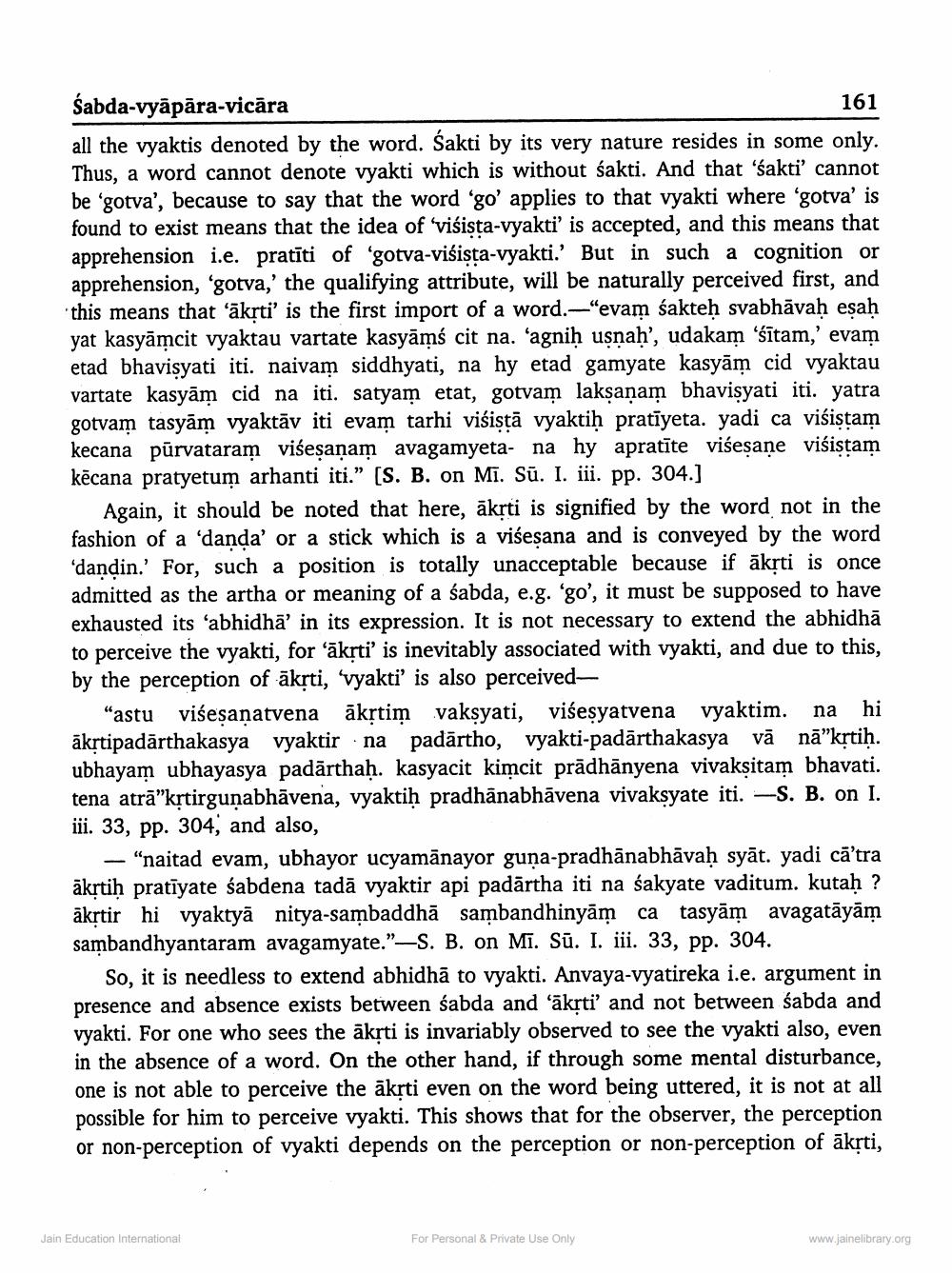________________
Sabda-vyāpāra-vicāra
161 all the vyaktis denoted by the word. Sakti by its very nature resides in some only. Thus, a word cannot denote vyakti which is without sakti. And that 'sakti' cannot be 'gotva', because to say that the word 'go' applies to that vyakti where 'gotva' is found to exist means that the idea of 'visista-vyakti' is accepted, and this means that apprehension i.e. pratīti of 'gotva-visista-vyakti.' But in such a cognition or apprehension, 'gotva,' the qualifying attribute, will be naturally perceived first, and this means that 'āksti' is the first import of a word.—"evam śakteh svabhāvah esah yat kasyāmcit vyaktau vartate kasyāmś cit na. 'agnih usnah', udakam 'śītam,' evam etad bhavisyati iti. naivam siddhyati, na hy etad gamyate kasyām cid vyaktau vartate kasyām cid na iti. satyam etat, gotvam laksanam bhavisyati iti. yatra gotvam tasyām vyaktāv iti evam tarhi viśistā vyaktih pratiyeta. yadi ca viśistam kecana pūrvataram višeșanam avagamyeta- na hyapratīte višesane viśistam kēcana pratyetum arhanti iti." (S. B. on Mi. Sū. I. iii. pp. 304.]
Again, it should be noted that here, ākrti is signified by the word not in the fashion of a danda' or a stick which is a visesana and is conveyed by the word dandin.' For, such a position is totally unacceptable because if āksti is once admitted as the artha or meaning of a sabda, e.g. 'go', it must be supposed to have exhausted its abhidhā' in its expression. It is not necessary to extend the abhidhā to perceive the vyakti, for 'ākrti' is inevitably associated with vyakti, and due to this, by the perception of āksti, vyakti' is also perceived
"astu višesanatvena ākstim vaksyati, viśesyatvena vyaktim. na hi ākrtipadārthakasya vyaktirna padārtho, vyakti-padārthakasya vā nā"krtih. ubhayam ubhayasya padārthaḥ. kasyacit kimcit prādhānyena vivaksitam bhavati. tena atrā”krtirgunabhāvena, vyaktih pradhānabhāvena vivaksyate iti. -S. B. on I. iii. 33, pp. 304, and also,
- "naitad evam, ubhayor ucyamānayor guna-pradhānabhāvah syāt. yadi cā'tra ākrtih pratīyate śabdena tadā vyaktir api padārtha iti na śakyate vaditum. kutah ? ākrtir hi vyaktyā nitya-sambaddhā sambandhinyām ca tasyām avagatāyām sambandhyantaram avagamyate.”—S. B. on Mī. Sū. I. iii. 33, pp. 304.
So, it is needless to extend abhidhā to vyakti. Anvaya-vyatireka i.e. argument in presence and absence exists between sabda and 'āksti' and not between sabda and vyakti. For one who sees the akrti is invariably observed to see the vyakti also, even in the absence of a word. On the other hand, if through some mental disturbance, one is not able to perceive the akrti even on the word being uttered, it is not at all possible for him to perceive vyakti. This shows that for the observer, the perception or non-perception of vyakti depends on the perception or non-perception of akrti,
Jain Education International
For Personal & Private Use Only
www.jainelibrary.org




